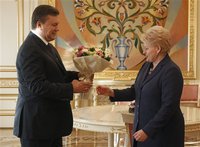Former Soviet state wants to set Ukraine against Russia
Lithuania assumed the role of the intermediary in the relations between Ukraine and the EU. President Grybauskaite visited Kharkov and Kiev, trying to convince Viktor Yanukovych to release Yulia Tymoshenko and thereby put at risk the prospects of European integration of Ukraine. Why did Lithuania need to resolve the disputes between Ukraine and the EU? Why is it so concerned about the European future of the Ukrainians?

A few days ago Grybauskaite paid a visit to Ukraine. It is noteworthy that the first place she went to was not Kiev to see her colleague, Mr. Yanukovich, but Kharkov, where Tymoshenko is serving her sentence. The Lithuanian President became the first European leader who personally saw Tymoshenko after she was sentenced to seven years for the signing of gas agreements with Russia.
The sequence of Grybauskaite's actions became a "black mark" for the Ukrainian leadership. Initially, she went to see Tymoshenko, and only then - Yanukovych. She has brought to her Ukrainian counterpart a clear position of the EU: the former prime minister should be immediately released because her prison term is considered political in the EU.
"Ukraine is facing a threat of isolation because of the situation with Tymoshenko. The result is the most important - that we were able to meet, that I was able to go to Kharkov to meet with your former Prime Minister Tymoshenko, and the fact that I was able to convey information, to convey (to Yanukovych) the opinion of the EU about the current situation and how it is estimated in Europe," said Grybauskaite on May 12 upon her return to Vilnius.
Following the president's interest in the fact that the European integration of Ukraine was threatened, other Lithuanian officials expressed their interest. On May 14 at a meeting of foreign ministers of Nordic and Baltic countries Deputy Foreign Minister Evaldas Ignatavičius took the floor. According to him, Ukraine should not be choked, but rather, a dialogue with it should be continued, and it should be drawn into the European processes.
"In an effort to maintain Ukraine on the path of European reforms, we must maintain open lines of communication and dialogue, and transmit all the necessary information at the highest level. Isolating Ukraine would be the easiest solution. It is more difficult to offer a way out of this situation. Association Agreement (between Ukraine and the EU) is the most important document. It has been proved that such agreements are pushing for reform," said the Lithuanian diplomat.
On May 15 Advisor to the President of Lithuania Mindaugas Zhichkus spoke on the topic of the relations between Ukraine and the EU. He also hinted that the Europeans should not go too far in pressuring Ukraine on Tymoshenko. "The pressure must continue, but the biggest mistake would be to turn away from Ukraine and then to provoke Ukraine to turn away from us", he stressed.
"I would urge both the Western partners, and human rights organizations that closely monitor these issues to exercise patience and not turn away from Ukraine, to continue their efforts to maintain a dialogue with it, respectfully explain, at the same time giving the opportunity to explain its position and the reasons for its decisions," said Zhichkus.
The question arises: why are Lithuanian politicians so concerned about Ukraine? Why did they do everything to ensure that the Ukrainian authorities listen to the concerns of the West about Tymoshenko? One answer is the ability of Grybauskaite to communicate without an interpreter with Ukrainian leaders. In this sense, she really is the perfect envoy. However, Lithuania is pursuing its own interests, which directly affects not only Ukraine, but also Russia.
Think back to the behavior of the precursor of Grybauskaite as president of Lithuania, Valdas Adamkus. The former head of the Lithuanian state played a very active role in the "orange" revolution in 2004. He repeatedly visited Kiev and on behalf of the EU openly put pressure on Leonid Kuchma to cancel the election lost by convenient for the West Viktor Yushchenko. Now the Lithuanian leader is trying to achieve her goals with respect to Tymoshenko.
During Yushchenko's presidency Lithuania was one of its main allies. Adamkus has repeatedly maintained his anti-Russian statement and called on Western countries to immediately accept Ukraine into NATO and to open its way to the EU. In the summer of 2009, Ukraine, Lithuania and Poland celebrated the 440th anniversary of the Union of Lublin, according to which the territory of the three above mentioned countries was part of the Commonwealth. This was presented as a symbol of "European integration" of Ukraine.
Grybauskaite has expanded the horizons of this policy. After Ukraine, she has actively started to "handle" Belarus. In 2009, Vilnius became the first European capital Alexander Lukashenko visited over the years of diplomatic isolation. Like today in the case of Ukraine, the EU called on the Lithuanian authorities not to put pressure on Belarus, in order not to break off the dialogue with them and not to push them into the arms of Russia.
The nightmare of the Russophobic-minded modern Lithuanian elite is the growing influence of Russia in the former Soviet Union. It must be confronted with all possible means. Even if Europe does not like Lukashenko it cannot reject him so he does not turn towards Russia. The same applies to Ukraine and Yanukovych.
Tymoshenko's defense is hardly relevant to the nature of the charges brought against her. In the eyes of Europe and Lithuania, she is a conductor of Western influence. The same situation is with the Belarusian opposition whom the EU asked Lukashenko to release. It is easier to pressure the authorities in Minsk and Kiev with the help of the free opposition.
Lithuania undertook the "noble mission of a mediator" in the separation of Ukraine from Russia.
Paul Chernyshev
Pravda.Ru
Subscribe to Pravda.Ru Telegram channel, Facebook, RSS!


